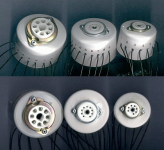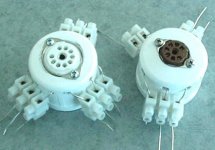I have a pair of 9 pin HP PCB's with old crumbling foam on the back.
I'm sure they were made to isolate scope input tubes (6DJ8) from
microphonics. HP sockets also had heavy duty metal shields/covers.
The original tubes I found inside were branded HP by Amperex.
A small PCB like this might again serve similar function? I am not
too sure what type of foam is supposed to survive the heat though.
Obviously the original material must have gave up after 50+ years...
And that was only in the deadly heat of a garage attic in Texas.
I'm sure they were made to isolate scope input tubes (6DJ8) from
microphonics. HP sockets also had heavy duty metal shields/covers.
The original tubes I found inside were branded HP by Amperex.
A small PCB like this might again serve similar function? I am not
too sure what type of foam is supposed to survive the heat though.
Obviously the original material must have gave up after 50+ years...
And that was only in the deadly heat of a garage attic in Texas.
Some board shown at the bottom, can be fitted with standard chassis mountable sockets and a long lasting breadboard is ready.
http://ckamps.com/boards.html
http://ckamps.com/boards.html
you can "just" make it out....
on my amp I put together a combo 8 and 9 pin board together with turret strips on either side (one red, one black..
http://usr.audioasylum.com/images/4/45887/22.JPG
JD
on my amp I put together a combo 8 and 9 pin board together with turret strips on either side (one red, one black..
http://usr.audioasylum.com/images/4/45887/22.JPG
JD
To revive this, are people still interested in this project? I got the OK from DIYAudio to do a group buy.
I received emailed interest from a few people (I'll email those people back to see if they are still interested.)
If we can reach a reasonable number, then I am happy to put together a group buy for both 7 and 9 pin experimenter PCBs. Email sockets@ecp.cc with interest. If a few people show interest, then I'll put together the details. I'd expect ordering for a week and a half or so and boards pretty quickly after that. Depending upon the number of boards, and the breakdown of types, I'd guess between $2.50 and $3.50 per board.
I received emailed interest from a few people (I'll email those people back to see if they are still interested.)
If we can reach a reasonable number, then I am happy to put together a group buy for both 7 and 9 pin experimenter PCBs. Email sockets@ecp.cc with interest. If a few people show interest, then I'll put together the details. I'd expect ordering for a week and a half or so and boards pretty quickly after that. Depending upon the number of boards, and the breakdown of types, I'd guess between $2.50 and $3.50 per board.
dsavitsk said:To revive this, are people still interested in this project? I got the OK from DIYAudio to do a group buy.
I received emailed interest from a few people (I'll email those people back to see if they are still interested.)
If we can reach a reasonable number, then I am happy to put together a group buy for both 7 and 9 pin experimenter PCBs. Email sockets@ecp.cc with interest. If a few people show interest, then I'll put together the details. I'd expect ordering for a week and a half or so and boards pretty quickly after that. Depending upon the number of boards, and the breakdown of types, I'd guess between $2.50 and $3.50 per board.
Hi Doug,
I stumbled upon this thread a couple of moments ago and I am definitely interested in getting some. Are you planning on doing octals as well? (I do have octal relay sockets and can use them instead.) I'm interested in both the 7 and 9 pin sockets and would probably take 4 x 7 pins and maybe 6 of the 9 pin sockets..
kevinkr said:Are you planning on doing octals as well? (I do have octal relay sockets and can use them instead.)
Unless there is an overwhelming demand, probably not. I think the cost of a board plus a socket plus some terminal blocks, plus some standoffs would push the price higher than the available relays.
Group Buy Thread
Group buy thread started at http://www.diyaudio.com/forums/showthread.php?s=&threadid=132348
Group buy thread started at http://www.diyaudio.com/forums/showthread.php?s=&threadid=132348
If boards is still not ordered, maybe for more easy work with this boards it is good idea to change connectors position little:
For 9 pin tube- 2 pole connector for pins 4,5 (heater), one 3 pole connector for pins 1,2,3 and second 3 pole connector for pins 6,7,8 and one more connector for pin 9.
So for dual triodes we have separate connector for heater, one for one triode and one for other triode.
For pentodes°use at least heater is on separate connector.
for 7 pin in similar logic.
Zigis.
For 9 pin tube- 2 pole connector for pins 4,5 (heater), one 3 pole connector for pins 1,2,3 and second 3 pole connector for pins 6,7,8 and one more connector for pin 9.
So for dual triodes we have separate connector for heater, one for one triode and one for other triode.
For pentodes°use at least heater is on separate connector.
for 7 pin in similar logic.
Zigis.
I've done some proto sockets almost exactly like Geek's pictures.
Either I didn't see his pictures when I suggested PVC end caps, or something filtered into my noggin in a subliminal fashion. Schedule 40 PVC end caps are about 50 cents apiece at the big-box hardware stores. I flattened the slight bulge at the end of some of the caps using a belt sander. Not really necessary in the long run, as the big hole for the socket takes out a lot of the bulge. I used a unibit and a drill press to make the socket holes - the PVC drills like butter. Putting in the socket mounting holes and the radial holes for the wires is a snap - you could really do everything with a small vise and a hand drill, though a drill press makes things easier. So far, I have a few 7 pin and 9 pin miniatures made up. I already userelay sockets for octal tubes, so that base is covered.
Next up are some compactron adapters for 9 pn Noval and Magnoval sockets, and the duodecars - a little larger end cap, more holes, blah, blah, blah. One twist to the concept would be to cut up some euro-style connector strips into two and three position bits, and hang them on the ends of the radial wires for solderless conections. Pictures of this will follow when I'm done. One thing to remember doing things this way is to use top mount sockets - the PVC is too thick and irregular to easily do under-chassis style sockets.
Either I didn't see his pictures when I suggested PVC end caps, or something filtered into my noggin in a subliminal fashion. Schedule 40 PVC end caps are about 50 cents apiece at the big-box hardware stores. I flattened the slight bulge at the end of some of the caps using a belt sander. Not really necessary in the long run, as the big hole for the socket takes out a lot of the bulge. I used a unibit and a drill press to make the socket holes - the PVC drills like butter. Putting in the socket mounting holes and the radial holes for the wires is a snap - you could really do everything with a small vise and a hand drill, though a drill press makes things easier. So far, I have a few 7 pin and 9 pin miniatures made up. I already userelay sockets for octal tubes, so that base is covered.
Next up are some compactron adapters for 9 pn Noval and Magnoval sockets, and the duodecars - a little larger end cap, more holes, blah, blah, blah. One twist to the concept would be to cut up some euro-style connector strips into two and three position bits, and hang them on the ends of the radial wires for solderless conections. Pictures of this will follow when I'm done. One thing to remember doing things this way is to use top mount sockets - the PVC is too thick and irregular to easily do under-chassis style sockets.
wrenchone said:I've done some proto sockets almost exactly like Geek's pictures.
Either I didn't see his pictures when I suggested PVC end caps, or something filtered into my noggin in a subliminal fashion.
I used 1KV rated wire and have used 6L6GC's in them with 700V on the anode with no breakdown
The PVC caps if you use "schedule 40" and not CPVC, can handle the heat as well as the voltage safely.
Cheers!
Shown are some breadboarding sockets inspired subliminally by Geek's. I don't remember seeing his sockets posted here, but maybe the input seeped into my hindbrain. At any rate, we both appear to be using schedule 40 end caps, which drill with ridiculous ease. I used bus wire to hook up to the sockets, and added cut-up bits of euro-style terminal strips to make it easy to do solderless connects on wires and components. There's enough lead left over for test prods or scope probes. Who needs a printed circuit board? I got some 1.5" caps tonight to use with compactron sockets. Those will need a little work with a coarse file or rasp to flatten off the ends a bit before I mount sockets. Still, not much work for an end product that will give and give.
Attachments
- Status
- This old topic is closed. If you want to reopen this topic, contact a moderator using the "Report Post" button.
- Home
- Amplifiers
- Tubes / Valves
- Experimenters Tube Sockets

